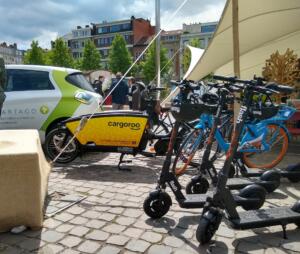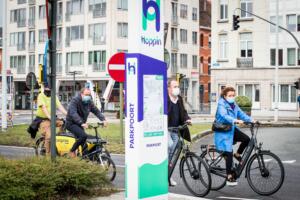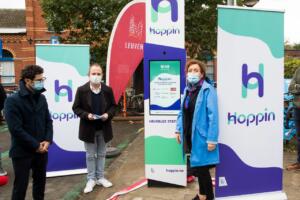That Leuven Feeling
POLIS’ Niklas Schmalholz examines two projects, eHubs and MOMENTUM, that are transforming mobility in the Belgian City of Leuven – with more than a little help from its own citizens.
Transferability is a critical topic for many European projects. If projects are to be successful, they must bring distinguishable benefits to cities and regions, changing mobility for the better and in a tangible way. So how can this be achieved? We examine the work of Leuven, a mid-sized city in the Belgian region of Flanders and home to around 100,000 inhabitants, is an important hub for commerce, jobs, academia, and healthcare. Its popularity has, however, left it with a big headache when it comes to transport.
On the one hand, there are workers commuting to the city with private cars during the week; on the other, tourists and buyers flood the city with their weekend commutes: the consistent traffic volume that is created by these two flows of movement of vehicles, people and goods adds pressure to the rising percentage of Leuven residents who use or would like to use bike and car-sharing services. But a headache can only be solved with the right medicine.
A prescription for new mobility services and a whole lot more traffic circulation
Leuven did not wait for the migraine to go – it decided to get its doctors (the local authorities) on the case and got a prescription for enhancing its traffic circulation plan and mobility offer for shared, electric and emerging mobility solutions, such as e-scooters, e-cargo-bikes and electric bikes. In drawing together eHubs, an Interreg North-West Europe project which aims to set up physical locations for shared and electric mobility services in urban environments, and MOMENTUM, a Horizon-2020 project supporting municipalities in modelling future mobility trends, Leuven has become a shining example of mobility innovation – and it has been crowned ‘European Capital of Innovation 2020’.

Showcasing new mobility in Leuven - DMOW - Department of Mobility and Public Works, Flanders
Into the crystal ball: The MOMENTUM Project and the future of mobility
Cities are facing an essential question once emerging mobility solutions are entering the urban environment: do new mobility services complement public transport or are they cannibalising the existing share of public transport? Can shared mobility help to bridge the distance between mobility hubs and homes, the so-called ‘last mile’?
The future of such mobility services, and the role they can play, remains uncertain. Therefore, data-driven models, which are used by MOMENTUM in Leuven and other partner cities, are attempting to predict the demand and supply of new mobility systems.
As we have set ourselves the ambitious target of climate-neutrality by 2030, we want to double the number of trips made by public transport and cycling in the next ten years.- Tim Asperges, Transport Policy Advisor for the City of Leuven
Furthermore, such models are used to enhance existing simulation tools and develop interactive tools for mobility monitoring and management, before sharing policy recommendations and best practice guides with the wider stakeholder community. In Leuven, this system is also utilised to assess the potential changes in the city’s traffic circulation plan. Nevertheless, this is not the only available tool for local transport planners to reduce the burden of the private car within the city.
Gaining MOMENTUM
Disruptive technologies and emerging mobility solutions such as MaaS (Mobility as a Service), CAVs (Connected Automated Vehicles), and new shared mobility services are radically changing urban mobility.
The goal of MOMENTUM is to develop a set of new data analysis methods, transport models and planning support tools to capture the impact of these new transport options on the urban mobility ecosystem, in order to support cities in designing the right policy mix to exploit the full potential of these emerging mobility solutions. The project started in May 2019 and will run for three years.
eHubs: digital future of shared and electric mobility
If you want to take the train, you go to the station, but where do you go to rent e-bikes, shared cars or cargo-bikes? This is what eHubs seeks to answer. eHUBS are on-street locations that bring together e-bikes, e-cargo bikes, e-scooters and/or e-cars, offering users a wide range of options to experiment and use in various situations. The idea is to give a high-quality and diverse offer of shared electric mobility services to dissuade citizens from owning private cars, resulting in cleaner, more liveable and pleasant cities. Besides Leuven, five other cities are dedicating a certain amount of curb sides, parking- and public spaces towards the goal of increasing active and emission-free mobility.
This reallocation of space facilitates the use of shared mobility offers, as dedicated spots allow for parking your shared vehicle quickly. This kickstart of pooling shared mobility solutions together into certain dedicated spaces will set an example for other cities in Europe and beyond. Large-scale implementation will cause a leverage by significantly reducing emissions in the cities and creating a growing market for commercial shared e-mobility providers. In Leuven, eHubs is establishing 50 ‘mobility points'.
The location selection was done in two stages, a top-down approach, which included a high-level decision to build several eHubs around our main transport hubs, as well as a bottom-up approach by organising consultations in the different neighbourhoods of Leuven.- Tim Asperges, Transport Policy Advisor for the City of Leuven
These mobility points – or Mobipunten in Dutch, offer a variety of shared mobility solutions, including bikes, e-bikes, e-cargo bikes and cars. Information about available vehicles and paying methods can be found and selected via a large touchscreen integrated into a metal pillar. Around 15 eHubs have been already installed in Leuven, with the rest to follow throughout 2021. Citizens will discover these new solutions slowly but steadily, as the number will rise in 2021. Currently, 46 shared vehicles are available: among them: five electric cars, 30 electric bikes and nine electric cargobikes (Cargoroo).
The deployment of eHUBS does not only target citizens of Leuven, who are looking for alternative modes to the private car, but also for commuters, visitors and tourists, aiming to visit the city in an easier and more sustainable way.

Making eHubs
eHUBS are on-street locations that bring together e-bikes, e-cargo bikes, e-scooters and/or e-cars, offering users a wide range of options to experiment and use in various situations. The idea is to give an high-quality and diverse offer of shared electric mobility services to dissuade citizens from owning private cars, resulting in cleaner, more liveable and pleasant cities. The eHUBS in Leuven will be characterized by the HOPPIN polls (digital and analogues), which refer to the branding of eHUBS foreseen by the Flemish strategy that aims at deploying 1000 eHUBS in the Belgian region by the end of 2024.
The deployment of eHUBS in Leuven will continue also over the next year, as the city’s objective is to provide citizens with a total number of 50 electric and shared mobility stations. This goal is also aligned to the ambitious city’s target of climate-neutrality by 2030, aiming at doubling the number of trips made by public transport and cycling by 2030.
Synergising for success
Leuven’s population is rising by around 1.000 people a year, and the commuters just keep on coming! This has left Leuven in need of updating its transport infrastructure. The City administration’s first step was the setup of a Sustainable Urban Mobility Plan (SUMP), which included a new traffic circulation plan to streamline traffic flows to certain main roads, while entirely removing traffic from some neighbourhoods.
However, removing traffic flows was not enough: Leuven’s SUMP required an effective – and efficient! – alternative to personal cars. The solution has come from eHubs and MOMENTUM projects: the eHubs project was able to support the city with the structural approach on the installation of the Mobipunten, while the MOMENTUM project has been examining the influence of these eHubs, using a new multimodal transport model that calculates the repercussions of the impacts on traffic circulation. Both projects help to provide additional mobility solutions to Leuven citizens, commuters, and tourists. Instead of simply banning vehicles, these EU-funded projects help to provide smart and modern solutions to navigate Leuven.
Citizen science to the rescue
So where does the city get its mobility data from? Turns out, it comes from its own citizens. The EU-funded WeCount project provides real-time data, thanks to traffic flow data collection by dozens of Leuven’s citizens. These automated computers recognise passing cars, cyclists and pedestrians and count them. By combining all this data, traffic flows and their changes across a day, week, month, or year can be evaluated.
WeCount
Five cities: Madrid, Ljubljana, Dublin, Cardiff and Leuven are coming together to mobilize 1,500 citizens throughout the coming year (2020) by following participatory citizen science methods to co-create road traffic counting A number of low-cost, automated, road traffic counting sensors are mounted on each participating household’s window facing a road, which allow authorities to quantify local road transport and the speed of cars, large vehicles, cyclists and pedestrians.
WeCount is establishing a multi-stakeholder engagement mechanism to gather data in these five pilot cities. Data will then be used to formulate informed solutions to tackle a variety of road transport challenges, thus improving quality of life at the neighbourhood level.
Leuven: by the people, for the people
As programmes in Leuven have demonstrated, EU-projects are not necessarily locked in an ivory tower far away from the real problems of citizens in urban environments. In fact, it is the opposite. As Leuven’s citizens continue to collect the data which directly shapes their own mobility solutions and facilities, the Belgian City proves a point: that successful projects are where the people are – inside their homes, on their favoured transport modes, in their streets.
About the author
Niklas Schmalholz is Project Officer at POLIS Network, nschmalholz@polisnetwork.eu
 Gaining MOMENTUM
Gaining MOMENTUM

 WeCount
WeCount